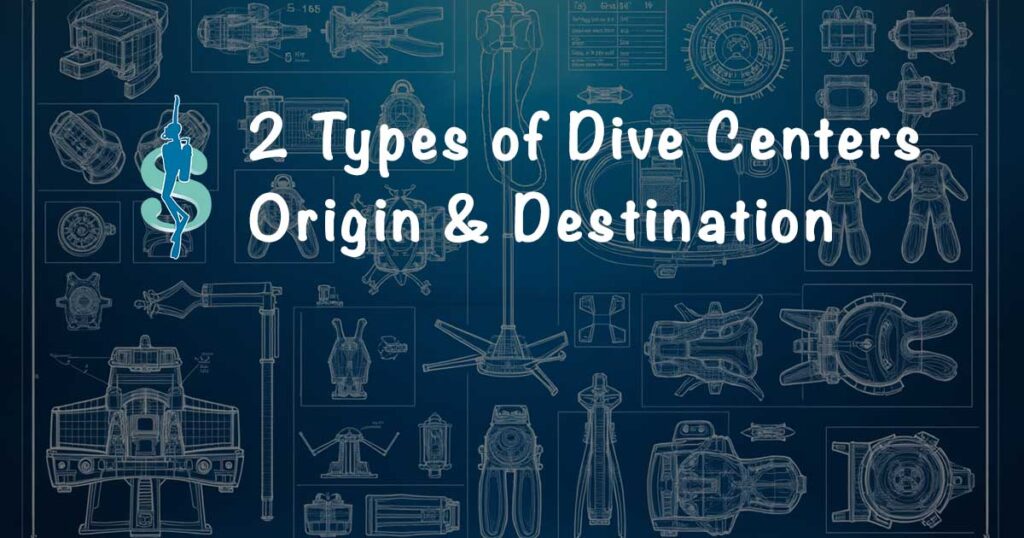2 Types of Scuba Diving Centers: Origin & Destination
Local dive shops and scuba diving resorts: What’s the same? What’s different?
Dive Centers are one group of stakeholders in the scuba diving industry. They are at the forefront of how the dive industry has been providing products and services to scuba divers since its inception. We believe they should be at the center of any dive industry restructuring, but in a significantly different role than the one they currently play.
There are two types of dive centers. They are very similar and yet totally different.
- Local Dive Shops: Origin dive centers.
- Dive Resorts: Destination dive centers.
Let’s summarize the similarities and differences between these two types of dive centers.
This post is part of our Shifting Tides: Dive Industry Assessment & Strategies for Today’s Scuba Divers series by the Business of Diving Institute and Darcy Kieran, author of:
Table of Contents
The purpose of this post is only to establish the current role of the dive center. We discuss changes needed to satisfy today’s consumers in Shifting Tides: Scuba Diving Industry Assessment & Strategies for Today’s Scuba Divers.
‘Origin’ Dive Centers (Local Dive Shops)
By ‘origin,’ we mean that these dive centers are located in areas with a large target market (population) but few, if any, dive sites. These local dive shops are typically located in urban cities, such as Little Rock and Atlanta.
Among the six businesses they operate under one roof, the traditional focus of the origin dive center has been on selling & teaching courses, followed by selling dive gear, and then sending these divers on a dive trip under tropical skies. This focus on peddling c-cards, first, and pushing the sales of dive gear, second, with “going diving” as the final step, is killing us. We need to put the experience of scuba diving at the forefront, and we discuss it in A New Paradigm for the Scuba Diving Industry: It’s About Diving!
Among the newly certified divers, the local dive shop keeps some repeat customers - clients buying more courses and gear, and going with you on a dive trip once a year.
While analyzing the different players in the dive industry, we quickly realize that local dive shops (origin dive centers) are facing challenges quite different from those of destination dive centers.
Are Local Dive Shops Becoming Irrelevant?
Traditionally, the local dive shop has been the primary point of entry for new divers. It made sense. There was no internet. Therefore, people who wanted to get into scuba diving were searching for training in the yellow pages, which were, at the time, the number one source of new clients.
Once this client was in contact with the staff at the local dive store, there were two consistent messages the wannabe diver would get from that store:
- “You should do your dive certification course with us before going on a dive trip because you have better things to do during your vacations. Do you really want to read a book by the pool bar?”
- “You should get your own dive gear from us. Who knows what kind of defective gear you will find in Cuba?” Fear is a dirty yet effective way to sell.
Today, the local dive shop is facing a perfect storm.
The number of certifications done annually is shrinking, core divers are disappearing, and sales of dive gear per diver are declining. Every stakeholder in the dive industry must deal with these facts. However, the local dive shop faces a more terrifying future: it is becoming irrelevant.
Wannabe divers can do the whole theory part of the scuba certification course on their iPad at work, the week before their vacation. Then, they can book a dive trip online and fly to their vacation destination to dive. They may never feel the need to look for a local dive shop. Therefore, the role and value of local dive shops need to be redesigned, seriously and urgently.
I can hear you saying that local dive shops are crucial for local diving. Yes, of course! But that is a minimal subset of the divers in your market. Most diving is done around the equator, not in your local dive quarry. And with more new divers going directly to sunnier skies, local diving will also suffer, unless it is redefined.
‘Destination’ Dive Centers (Dive Resorts)
We prefer the term “destination dive centers” to “dive resorts” because the dive destination doesn’t have to be a resort.
For instance, a dive center in Key Largo, Florida, with a fleet of dive boats, is a dive destination. It’s a dive center with all six businesses under one roof. However, it is not a traditional resort, as it is not part of a hotel complex. There are plenty of hotels around Key Largo, though.
Another example is a liveaboard. It’s not a resort, but it’s still a dive destination.
As for destination dive centers on land-based, full-size resorts (like some of those found in Cozumel), most of them are operated as small businesses within a large resort.
In all of these cases, the focus of the destination dive center is on offering diving services. Typically, these dive centers sell very little dive gear. However, they sell a wide range of t-shirts, hats, and other apparel and accessories.
Different Marketing Targets
Another significant difference between the origin and destination dive centers is the target market.
An origin dive center in Omaha can focus on optimizing its ad for “scuba diving” in Google searches, specifically in and around the Omaha area. Meanwhile, the destination dive center can recruit all over the planet. And it’s not easy for a destination dive center to create repeat customers, as many divers want to explore new places during their hard-earned annual vacations. The marketing of a destination dive center is therefore much more challenging, as you are competing with all other dive resorts, charter boats, and liveaboards around the world.
Either way, the destination dive center is hit by the drop in new divers and the shrinking of the core diver group – those scuba divers who go on numerous dive trips every year and buy everything with a dive flag in your dive shop.
Generational Trend
A generational trend that we’ve noticed is also creating a problem for dive destinations that offer only scuba diving.
Older baby boomers, who dreamed of “being” a scuba diver and finally obtained their certification, will head to a dive resort in a remote location with nothing else to do but scuba dive (and attend the bar) and be happy.
The younger generations seem more interested in “doing” a bit of scuba, here and there. They do not necessarily define themselves as “being” a diver. In that regard, they will prefer a vacation destination where they can spend a couple of days scuba diving, a couple of days hiking, and a couple of days doing other activities.
The traditional dive destinations that strictly focus on scuba diving are also facing a perfect storm.
New diver certifications are down, the core diver group is shrinking even faster, and the younger generations want a destination with more diversified activities.
Traditional dive resorts and liveaboards have, in part, contributed to this problem by being overly focused on a single aspect of the experience. The interest in engaging in activities beyond scuba diving began some time ago. I remember a group I brought on a liveaboard in the Caribbean. The service was excellent except that, no matter how many times we asked the crew to give us access to the kayaks sitting on the roof, we never got to go kayaking. The crew was annoyed by our request.
What Else?
The most significant discussion we need to have about dive centers is how to provide value to today’s customers.
For instance, when it comes to dive gear, people expect to be able to buy everything and receive it, at the latest, by the next day. They do not understand, nor do they care, that you have to order the missing size BCD from your supplier, who will send it to you three months later. Either you satisfy the customer now, or he will be gone.
The second part of this discussion is on the experience. The lack of consistency in the quality of the experience at different dive centers is hurting everybody in the dive industry.
Related topics:
- Benchmarking Local Dive Shops (origin dive centers)
- Benchmarking Dive Resorts (destination dive centers)
Continue reading about Shifting Tides: Scuba Diving Industry Assessment & Strategies for Today’s Scuba Divers.
If you found the information on this page valuable, would you consider buying me a coffee?
Either way, let’s work together on “raising the bar” in the dive industry to satisfy today’s consumers!
Your Dive Industry Compass
Scuba Diving Market Research, Surveys, Reports & Statistics
Shifting Tides
Strategies for Today’s Scuba Divers
Living The Scuba Dream
Plan Your Scuba Instructor Career & Deep Dive the Plan
You may also be interested in The Immersion Zone (our podcast), Scubanomics (our newsletter for dive professionals), and our published books & reference guides.





